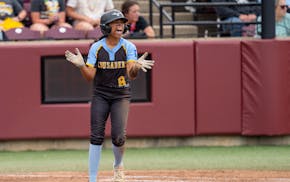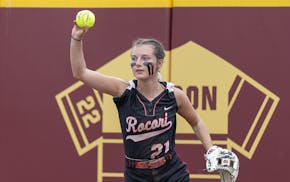When last the Gophers took the field, they were on the receiving end of a 52-10 drubbing delivered by second-ranked Michigan, a team that imposed its will on Minnesota.
While Gophers fans understand that losing to a team that's a decent bet to be in the College Football Playoff for a third consecutive year wasn't a surprise, the manner of the loss — by 42 points and with little pushback — left a sour taste. Each facet of the Gophers' game can be assigned part of the blame for the result, but what's clearly frustrating the fan base is an offense that doesn't pass the ball effectively or often.
If you pore over the NCAA football statistics, it doesn't take long to see the issue. Among the 133 teams playing at the FBS level, the Gophers rank near the bottom in several passing categories. They're 130th in passing yards per game (132.8), 123rd in passing attempts per game (23.0), 128th in quarterback rating (107.79), 123rd in yards per attempt (5.8) and 117th in completion percentage (.551).
It would be easy to say quarterback Athan Kaliakmanis has struggled, but the trend goes back to when Tanner Morgan was the starter, too. The Gophers ranked 116th in passing yards per game last year and 118th in 2021. They were 126th in attempts per game last year and 127th in 2021. And their touchdown pass totals have ranked 103rd this year, 113th in 2022 and 106th in 2021.
By design, the Gophers under coach P.J. Fleck are not a pass-heavy team. Fleck, a disciple of former Ohio State coach Jim Tressel, prefers the "Tressel-ball'' style of run-based, clock-draining drives that keep the opponents' offense on the sideline, helping Minnesota's defense.
The strategy served Fleck extremely well with a Cotton Bowl team at Western Michigan in 2016 and with the Gophers in an 11-2 season in 2019. That year, Morgan had a pair of future NFL receivers, Tyler Johnson and Rashad Bateman, as his top targets and threw 30 TD passes. The past two years, with the running game stressed, the Gophers posted 9-4 records.
In many ways, Tressel-ball is the equivalent of hockey's neutral zone trap, a defensive strategy that limits opponents' scoring chances but also can choke the life out of the game. Fans might embrace the neutral zone trap if their team is winning big. If the team is not winning, though, the trap makes for an awfully long night at the rink.
At 3-3 overall and 1-2 in the Big Ten, the Gophers fall into that not winning category. They return from their bye on Oct. 21 at Iowa, starting a six-game stretch that will complete their regular season and determine if they will contend for the Big Ten West Division title or even make a bowl game. They need three more wins to guarantee a postseason spot and likely five more to even have a chance at the West title.
A glaring difference from 2022 and this year is the drop-off from 8.4 yards per pass attempt (tied for 18th nationally) to 5.8 (123rd). A return to form of tight end Brevyn Spann-Ford would help that stat. Spann-Ford, who averaged 11.8 yards on his team-high 42 catches in 2022, is averaging 5.1 yards on his 13 catches this year.
The Gophers endured a tough night against Michigan, and none more than Kaliakmanis. The QB completed only five of 15 passes for 52 yards with no second-half completions and two interceptions returned for TDs against a rugged defense. The good news: That game is in the past, and the passing game has six more chances to improve.

Softball state tournament: Champlin Park (4A), Rocori (3A), St. Cloud Cathedral (2A) are champions

Champlin Park turns a big moment into the Class 4A softball championship

Rocori rolls past Byron in Class 3A for its first state title in 11 trips

Gophers men's hockey team adds defenseman Finn McLaughlin, who flipped his commitment from Denver

